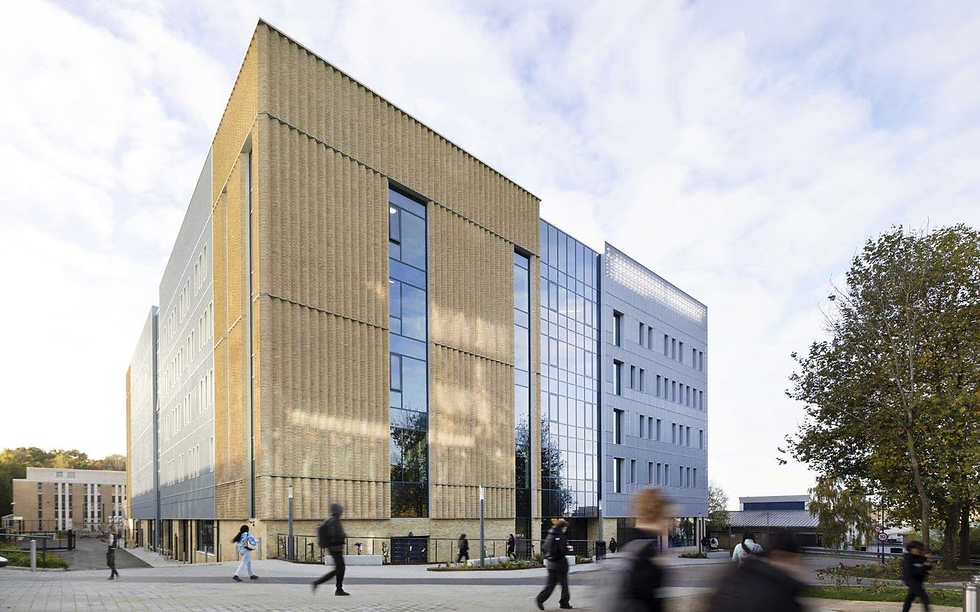Deputy Chief Executive of Stevenage Borough Council at Cambridge 'Science Cities'
- Heather Fearfield
- Jun 30, 2024
- 3 min read

Above: Stevenage Bioscience Catalyst campus at Gunnels Wood, home to the Gene and Cell Therapy Manufacturing Catapult (Courtesy GSK and SBC)
Future Cities Forum is delighted that Tom Pike, Deputy Chief Executive of Stevenage Borough Council will be contributing to our 'Science Cities' discussion event this September.
Previously he was Head of Resources at London Borough of Barnet.
He will join Cllr Bridget Smith, Leader of South Cambridgeshire District Council .and Nick Kirby, Managing Director of Cambridge Biomedical Campus, who is hosting Future Cities Forum.
Last year Stevenage Borough Council announced a £1bn regeneration programme working with the Stevenage Development Board, to deliver a mixed-use town centre reflecting the aspirations of its people, and businesses, and recognising its new town heritage and spirit.
Stevenage Borough Council has stated:
'Stevenage has many existing attributes, and we are building on these to enhance Stevenage as a town where people want to live, work and play.
'Stevenage was built to be a utopia, a place where normal people could have great lives. It is a town with a number of advantages all in one place: green parks and open spaces, a variety of shops, a leisure park with activities for the family alongside playing home to a series of international, sector-leading organisations and life science companies. To put our business credentials into perspective, a quarter of the satellites currently orbiting the globe were built here, and Tim Peake controlled the ExoMars Rover from Airbus’ site in our town.
'Although change has already been delivered on the ground, visibly improving the aesthetic and local offering, the town centre is in need of further rejuvenation and along with our development partners, we are delivering a £1bn regeneration programme designed to transform Stevenage. We will continue to diversify the current use of the town centre, bringing residential, leisure, commercial space, evening economy, active travel and arts and culture.
'We have partnered with a number of private sector organisations such as Mace and Reef Group to bring change to the town, which is already being seen. Mace, the firm that built the Shard, will deliver the £350m SG1 scheme, a development formed of a series of units that will introduce new residential, retail and leisure opportunities – along with a combined public services hub – to the town centre. Development has already been delivered by Reef Group, such as a £50m upgrade to Queensway North, with mixed-uses including a gym and restaurants. Elsewhere, we are working with other partners such as Guinness Partnership to bring new affordable housing to the town centre.
£37.5m of funding has been secured through the Town’s Fund, with Stevenage being awarded the second-highest allocation in the country. This money will be used for nine projects throughout the town, which have been shaped in consultation with the local community. The Stevenage Development Board provides strategic leadership and oversees the projects allocated funding, as well as being instrumental in the creation of the Stevenage Town Investment Plan.
Only a short drive from Stevenage station, Stevenage Bioscience Catalyst has evolved into a leading location for companies to develop and commercialise cutting edge therapeutics. Companies based at the Stevenage Campus employ over 3,500 people. The Campus is home to major organisations including GSK, the Cell and Gene Therapy Manufacturing Catapult, LifeArc and Cytiva alongside a growing cluster of start-up companies which together have raised over £3bn in funding.
At our September 2022 'Science Cities' discussion Tom Pike commented:
'Some successes come from our very large development site (at the Stevenage Bioscience Catalyst). Within the town there is also strong support for start-ups. Our challenge in the future, it is how to grow our start-ups and how to regenerate the town to attract people to live and work there. We need to look at how Cambridge has developed around the station and make sure we create a great front door.'
Tom was asked whether the collegiate nature of the campus had helped start-ups develop and which cultural attractions would be put in place in the town to attract people to re-locate:
'The collegiate effect has given start-ups access to training rooms and specialist support from a wide range of firms. Companies coming out of the campus have raised £2.9 billion and that shows a real merit in collaborative working. We are also now developing 65 thousand square feet of science space in the town.
''We need lots of green spaces in the town, which doesn't have a history like Oxford or Cambridge, but we need to focus on areas of success, the great quality of housing and creating a mix of that for younger people, so that living here is much easier on cost, but also ensuring family homes are being built too. We need leisure such as theatre, sport and outdoor space.






Comments